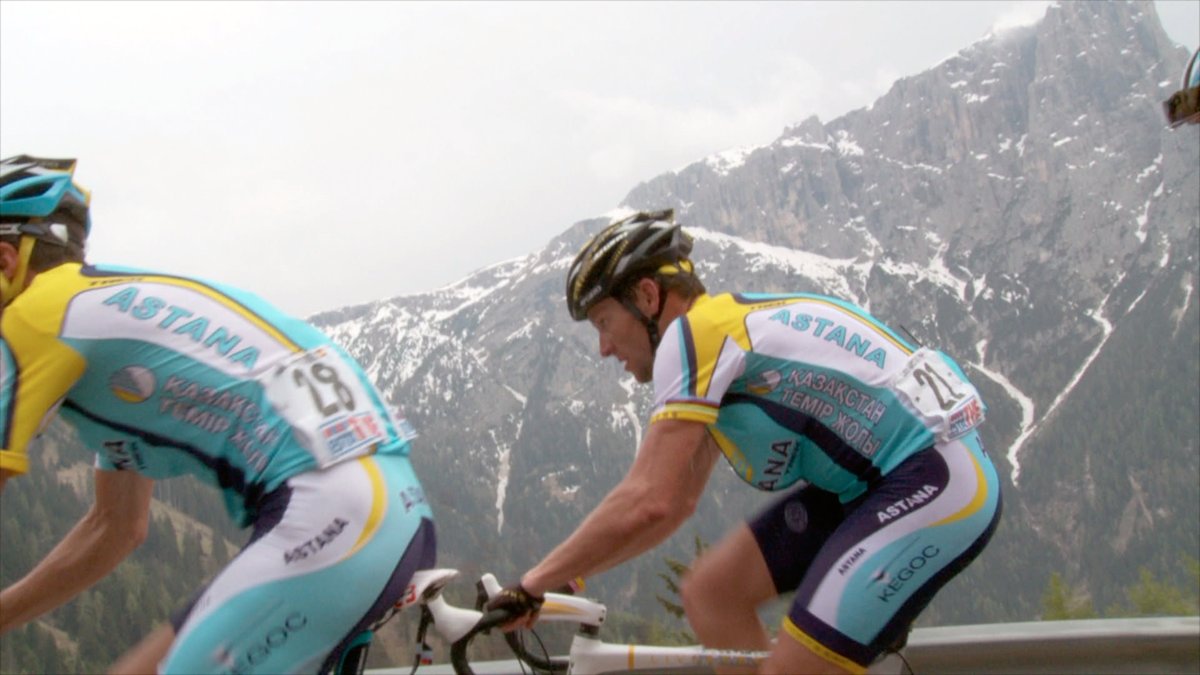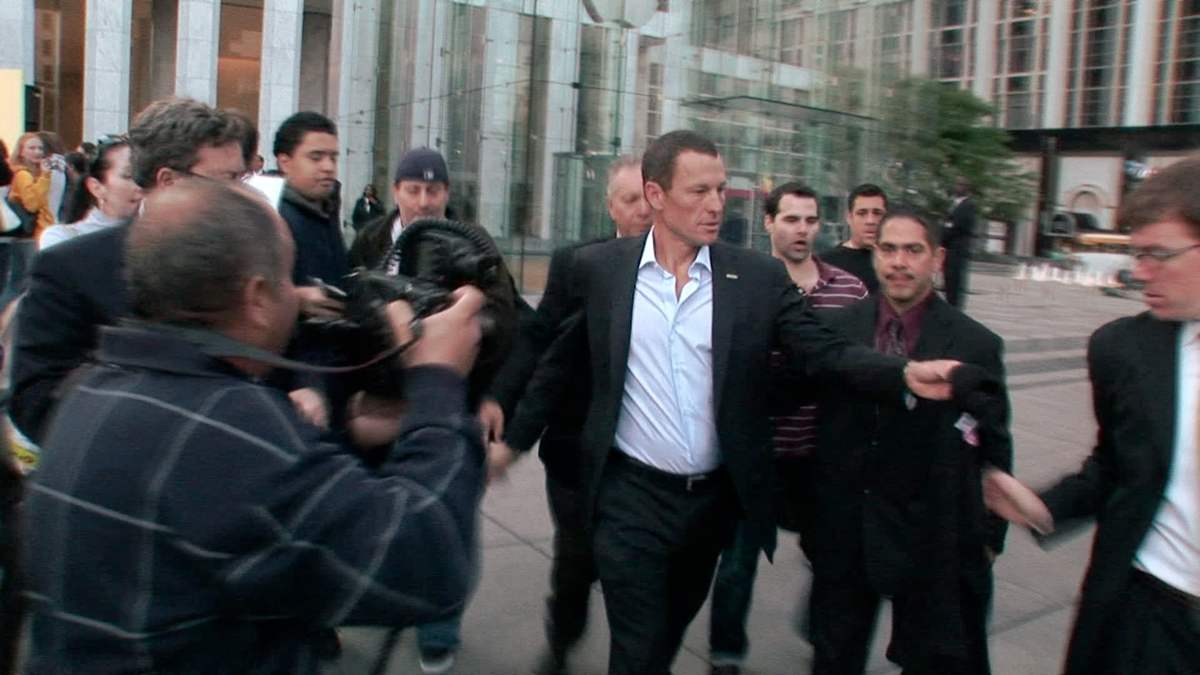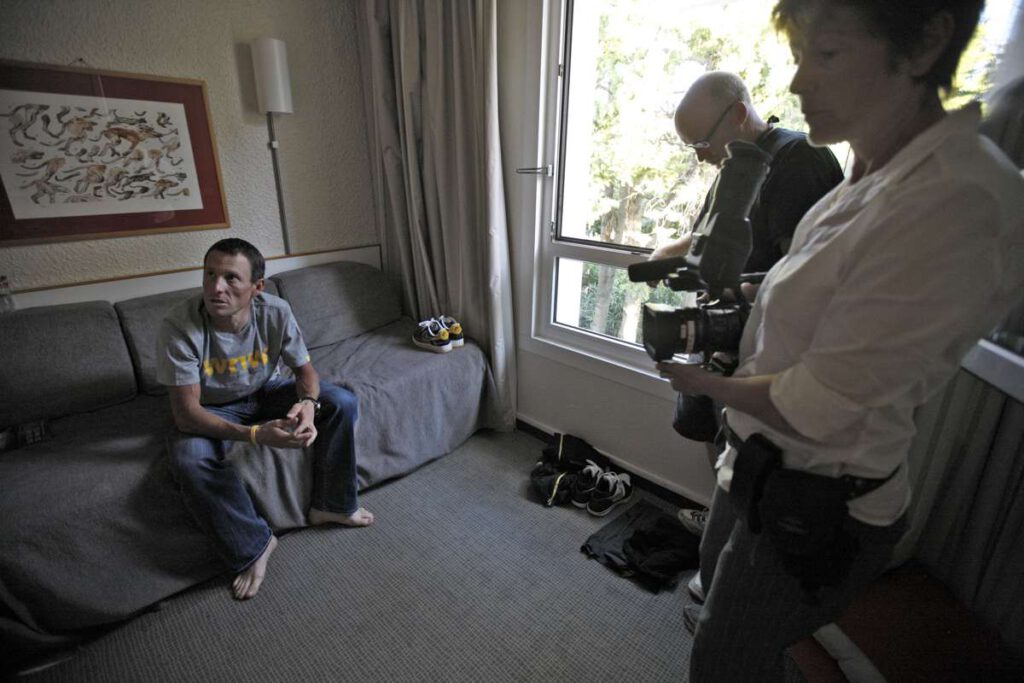Over the decade or so, prolific documentarian Alex Gibney has tackled such weighty subjects as economic malfeasance (“Enron: The Smartest Guys in the Room“), the war in Iraq (the Oscar-winning “Taxi to the Dark Side“), political corruption (“Casino Jack and the United States of Money”), pedophile priests in the Catholic church (“Mea Maxima Culpa: Silence in the House of God”) and the controversy surrounding Wikileaks and founder Julian Assange (“We Steal Secrets: The Story of Wikileaks”). Therefore, when he was asked to follow cycling champion Lance Armstrong during his 2009 bid to come out of retirement in order to win an unprecedented seventh Tour de France, he signed on to make what he assumed would be a straightforward and upbeat tale of an athlete trying to regain his crown against overwhelming odds. In fact, he made that movie, “The Road Back,” but just before it was ready to be released, the allegations of doping that had followed Armstrong around throughout his career finally blew up in his face—in no small part because of his insistence of making the comeback instead of quietly resting on his laurels—and left his career in tatters and Gibney without a credible movie.
After shelving it for a couple of years, Gibney decided to restructure the film in a way that would examine the lies that Armstrong had built his enormously profitable empire upon and why it was that so many people, Gibney included, allowed it to go on for so long even though it seems almost impossible to believe in hindsight. Utilizing footage shot for the original film, new interviews with journalists and former teammates who often paid a steep price for their accusations in the past and, most fascinating of all, a couple of discussions with Armstrong himself that were conducted in the immediate wake of Armstrong’s much-criticized interview with Oprah Winfrey that failed to win him much sympathy with the public. The resulting film, “The Armstrong Lie,” is a fascinating tale of hubris run amok and the lengths that people will go to in order to perpetuate a falsehood if the profit margin is high enough in the end. Even if one’s sum knowledge of the world of competitive cycling comes entirely from long-ago viewings of “Breaking Away, the film is an absolutely engrossing document of the dark side of the desire to win at all costs.
Gibney, who has just completed a new documentary on Nigerian singer Fela Kuti, recently got on the phone to discuss “The Armstrong Lie” and the unexpected way in which the project evolved before his eyes.
Many of the key documentaries that you have done have dealt in one way or another with lies and the ways in which they are conceived and cultivated. In those cases, of course, the untruths had already begun to unravel and you were able to analyze just how they were able to develop and take hold. In the case of “The Armstrong Lie,” what was it like to make a film about lying in which the lies in question were still unfolding, even though you may not have known it at the time?
Well, I think you put your finger on it—I didn’t know it at the time and I think that is what made it interesting. One of the reasons that I wanted to take this project on was to come in and do more of an observational film—just be along for the ride and play it as it lays. That was fun but even more intriguing was that it wasn’t until a few years later that I realized what I had been photographing. When I went back into it, I sometimes saw a very different meaning than I might have been able to glimpse at the time. It teaches you something about how history works.

Considering that the film, at least in its original conception, was so radically different from the politically charged exposes you had done in the past, how did you come to sign on to do a Lance Armstrong documentary in the first place?
Well, Frank Marshall, who is a famous film producer, and Matt Tolmach, who now produces the Spider-Man films, had been developing a fictional film based on Lance Armstrong’s book “It’s Not About the Bike.” They had tentatively gotten Matt Damon to agree to star and they were trying to get a script but they couldn’t get the script that they wanted. When Lance announced his comeback, they immediately pounced and decided to do a documentary about it. Lance agreed and they went to look for a director and came to me. I was interested because I was interested in the idea of will. I’m a sports junkie and I am interested in athletic will—how you exceed the expectations of your own performance when it counts to deliver something beyond yourself so that you can win. I was also interested in the darker side of it, sort of the “There Will Be Blood”-Daniel Day Lewis darker side of winning. I figured Lance might have, like the executives at Enron, a kind of belief in winning at any cost. I wanted to do it for those reasons and because I thought it would be fun to do a different kind of story—instead of going in after the fact, I would be along for the ride.
Before going into this project, did you have any real working knowledge of Armstrong and his past beyond the obvious headlines?
Only the shockingly obvious. In fact, when I first met Lance, I told him “I know that you ride a bicycle and that you are good at it and beyond that, I don’t know much.” It was a little bit like Enron—I didn’t know anything about accounting when I started the Enron film and as it turned out, I needed to know a lot about accounting. Of course, I was aware about the allegations of doping—you would have had to have been deaf, dumb and blind not to have been aware of them.
What was your initial impression of Armstrong when you first met with him?
He had tremendous charisma and he was a bit forbidding—I wouldn’t exactly call him the warm and cuddly type. He is not a seducer like Clinton but he seemed impressive. He was possessed with a great deal of self-confidence. I think he was okay with and appreciated the idea that I was honest with him and didn’t try to blow smoke up his ass about how much I knew about cycling, which was nothing. I am glad that I didn’t try to go that route, which is not my style, but I am sure that has happened to him.
While out there filming him during the 2009 Tour de France, what was the reaction from other members of the press covering both him and the race? Were they suspicious that you were going to be making the kind of wart-free hagiography that would minimize the darker aspects of his story?
There were some people who wanted to see anything that Lance Armstrong did and so that was intriguing to them. There were a lot of people who were known critics who really would not even talk to me because they felt that I was embedded in the Lance Armstrong army and therefore was an enemy that couldn’t be trusted with the truth, which I found frustrating. Even people who were friends of Lance seemed surprised that I was doing the movie and in retrospect, I suppose I am surprised too. Did they not know any of the other films that I had done? I don’t know. Maybe in some peculiar way, there was, in addition to the supreme confidence that the lie would never be exposed, a sense of the criminal going back to the scene of the crime—is that because they left a few dollars on the floor or because they secretly want to get caught?
During the period in which you were filming him during the 2009 Tour, were there any particular instances that caused you to begin to question his credibility?
I never found any evidence at the time in 2009 that he was doping. There were certainly times then when I knew that he was lying to me. One of them was this issue of insisting that Frankie Andreu be the only one to interview him—I was with him in the car when he hatched that plan. I never found any evidence in 2009 that would have led me to believe at the time that he was doping that year.
How close to completion was “The Road Back” before the Armstrong story changed forever?
It was complete. It was mixed. It was a different kind of a film. It was a sports film about an athlete trying to come back and win. It did include allegations of doping in it and the title was intentionally chosen to refer not only to the comeback story but to the real road back—i.e. the road to the past. I always felt that there was a bit of redemption in his desire to come back and say to his critics “Watch me. I am going to race clean and beat everybody!” Obviously, we now know that this was the thing that ended up exposing him.
Perhaps not to this degree but have you ever worked on a project before in which the story you were telling made such an abrupt shift while you were working on it?
Not as big. In “Taxi to the Dark Side,” things certainly happened along the way in terms of court decisions that were impactful. After the broadcast of “Mea Maxima Culpa” on HBO, the Pope resigned. However, there was never a turnaround quite as big as this because of the power of the lie. It is hard to imagine now but the power of the lie was that it could hide in plain sight and no matter what the allegations were, Lance could beat them back. People were afraid, even in a casual interview, to say that he doped, even though they were pretty sure that he did, because the consequences would be so dire. It was the lie that dared not speak its name and that turned around so completely that during the legal review of the film, lawyers wouldn’t let me put in certain things that Lance said because he was no longer credible. Before, they might have been worried that if we had allegations of doping, we might get sued by Lance.

Between your film and the new book “Wheelmen,” which chronicles Armstrong’s entire story and history of doping in detail, one of the most astonishing aspects of the whole saga is that he was able to get away with his deception for so long.
It is shocking and almost staggering. In that way, it is a lot like the Enron story as well. It is hard to remember but back then, Jeffrey Skilling was elected by some group as CEO of the Year. It is staggering that this lie was hiding in plain sight for so long and there was just this general agreement that the lie was so attractive and productive that nobody was going to undo it. One of the things that “Wheelmen” points out, and I think we point out as well, is that people, including Lance, were making so much money off the lie that it became addictive.
When did the idea come to revamp “The Road Back” into “The Armstrong Lie” and how difficult was it to get Armstrong to sit back down to talk to you after the lie had been exposed and after the confessional interview with Oprah did not turn the tide of public opinion back in his direction?
I think I always hoped that I would get back into the story once the allegations began to emerge. Now there was always a chance that Lance might beat them back one more time and if that had happened, we might have added a few end title cards and called it a day. The investigation into Lance took on a life of its own and suddenly the lie was exposed, so that was an important thing. We had what nobody else had, which was real-time evidence of how the lie was promoted in 2009. The decision to go back into it was one I was always enthusiastic about but it was hard to figure out how to do it structurally. I felt very strongly that I wanted to retain a great deal of the 2009 Tour, both because I love the sport so much and because to understand a lie like this in sports, you have to understand the process of rooting for the athlete to win and I had been very much involved with that.
For those reasons and to simplify the complicated structure, I had to put myself at the heart of the story as a way of confessing to people that I had been made a part of the promotional apparatus as well. It served a number of purposes. I have certainly narrated films before but I have never put myself in the middle of any of them before except for another sports film that I did for ESPN called “Chasing Hell” and briefly in “We Steal Secrets” in which I reference a conversation that I had with Julian Assange. I felt that for this film to make sense and work, it needed to be seen through my experience. It was the only way to understand it and be honest about what it was that I had seen.
Since putting “The Armstrong Lie” together, have you had contact with him or do you know if he has seen it?
He hasn’t. We offered him an opportunity to see it and he sent his representatives instead. The last contact I had with him was when I let him know that the film was going to be called “The Armstrong Lie.” He sent me a rather cryptic note that said “I don’t know whether to be more annoyed that you called the film “The Armstrong Lie” or that you still can’t spell the word ‘tele-tron’.”
Is there any chance of one day seeing the original version of “The Road Back”—perhaps as a Blu-ray extra—to see how the film would have turned out if the lies had not been finally exposed?
We are trying to work that out. It is a complicated legal problem because of the way that the Tour de France works. We had to pay for permission to film there and to be able to show all of the film, we would have to license a lot of other footage. We were only allowed to include so much footage and anything beyond that, even if we had shot it, was embargoed. We are trying to wrestle with the legal issues. We will certainly include some sequences from that film on the DVD but whether we can show the whole film, which I would like to do, is now up in the air from a legal perspective.












